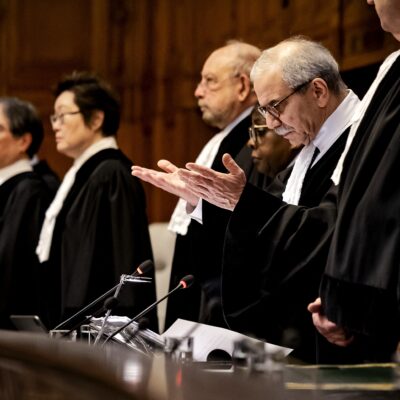House lawmakers press Treasury Department on actions to counter Iran and Hamas
Lawmakers on both sides of the aisle suggested that the Treasury Department is failing to be proactive enough or act expeditiously enough

Susan Walsh/AP
Treasury Secretary Janet Yellen, right, and Treasury Undersecretary for Terrorism and Financial Intelligence Brian Nelson, receive a briefing during a visit to the Financial Crimes Enforcement Network (FinCEN) in Vienna, Va., Monday, Jan. 8, 2024.
Lawmakers on both sides of the aisle suggested at a House Financial Services Hearing on Wednesday that the Treasury Department is failing to be proactive enough or act expeditiously enough to counter the international networks that help finance Iran and its terrorist proxies.
Pressed repeatedly on how Treasury is cracking down on further Iranian profits and transfers of funds to its proxies, Brian Nelson, the undersecretary for terrorism and financial intelligence, said that the department is working actively to sanction entities involved in Iran’s illicit finance operations, highlighting last week’s sanctioning of a Chinese oil buyer. He also noted that the department has issued several new rounds of sanctions against Hamas and its affiliates since Oct. 7.
But, Nelson said, given that much of Iran’s oil trade is insulated from the international financial system, Treasury has limited tools to counter it.
“What we’re trying to do is nonetheless focus on those touch-points to the international financial system” that Iran uses to move money back into Iran, he said, as well as Iran’s so-called ghost fleet of smuggling ships.
Several lawmakers raised specific cases of concern.
Rep. Zach Nunn (R-IA), highlighted a recent report that ships in Iran’s smuggling fleet had been insured by a U.S.-based company — something Nunn said Treasury had denied to him as recently as December.
Nelson responded that Treasury is looking into the situation and “taking it seriously” and would follow up.
Rep. Ritchie Torres (D-NY) highlighted reports that the U.S.had been alerted to various international assets held by Hamas, questioning how long it took Treasury to take action after learning of these assets.
“We go through a process where we have to develop an evidentiary package that meets legal sufficiency and work through our interagency,” Nelson responded, repeatedly dodging Torres’ specific inquiries on when Treasury was informed.
Rep. Wiley Nickel (D-NC) called on Treasury to “dramatically increase efforts to stop the flow of resources to Iran and its terrorist proxies.”
He focused his questioning on a recent Treasury declaration that the Al-Huda bank in Iraq was being used for money laundering and was fully controlled by the Islamic Revolutionary Guard Corps; Nickel highlighted that Al-Huda had operated for 15 years, conducting transactions with the American financial system, unimpeded.
Andrea Gacki, the director of the Financial Crimes Enforcement Network, said that Treasury became aware of the issue “in recent years” and began investigating, but emphasized that Treasury’s responses do not “take place in a vacuum, we must balance it with the national security and foreign policy imperatives and ensure that the timing is just right.”
She said the department was “proud” of the action it had taken, pointing to the “robust public record” it assembled of the bank’s wrongdoing, which “took some time.” She argued that Treasury’s approach helped to build international consensus in support of the U.S.’s efforts.
Lawmakers also questioned the witnesses about a sanctions waiver the administration renewed last year to allow Iraq to continue to purchase electricity from Iran; Iran’s proceeds from that arrangement are held in an account in Oman and are restricted to humanitarian transactions.
Reports indicated that the recent waiver had allowed for $10 billion to be transferred from Iraq to the Omani account; Nelson claimed that only $500 million had been transferred. And he said Iran has made just two transactions from that account, indicating that Iran has not accessed the funds since at least December, when those two transactions were first disclosed to Congress.
He also repeated a talking point from other administration officials that the funds involved are never controlled directly by or enter into Iran, and purchases are subject to a vetting process.
The current sanctions waiver is set to expire in March, Nelson said, and the State Department generally consults with Treasury about sanctions waivers, but has not yet done so for a potential March renewal.
Rep. Tom Emmer (R-MN), the House majority whip, seen as one of the cryptocurrency industry’s strongest allies in Congress, pressed Nelson to refute Wall Street Journal reporting suggesting that Palestinian terrorist groups received millions in funding through cryptocurrency.
Nelson declined to provide specific dollar amounts publicly, but said that cryptocurrency has not proven to be a major tool for terrorist groups, although he said terror groups do see it as an “area of opportunity.”
Emmer responded by calling the WSJ report “misinformation” which he said is driving Senate legislation that “would literally destroy innovation in this country.”










